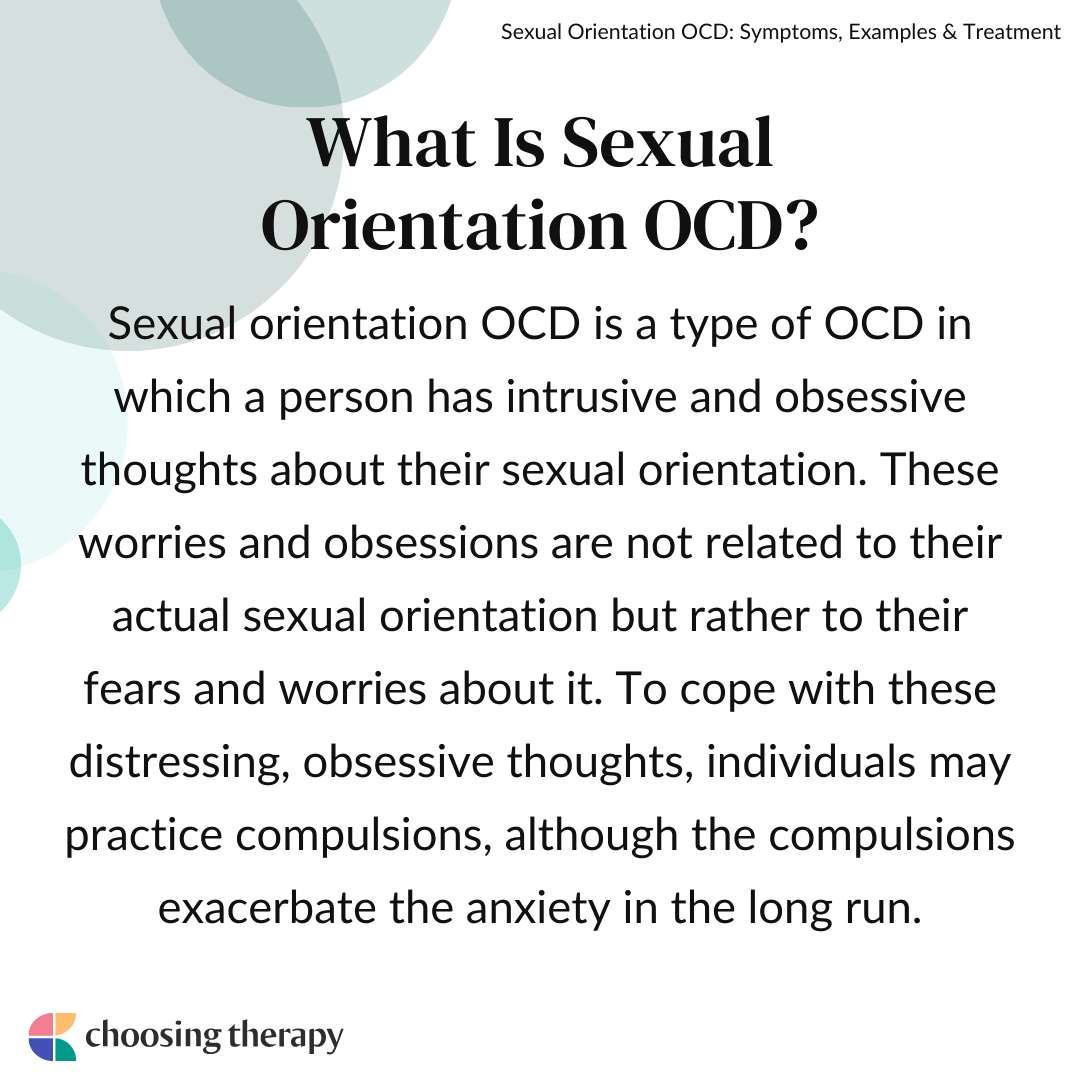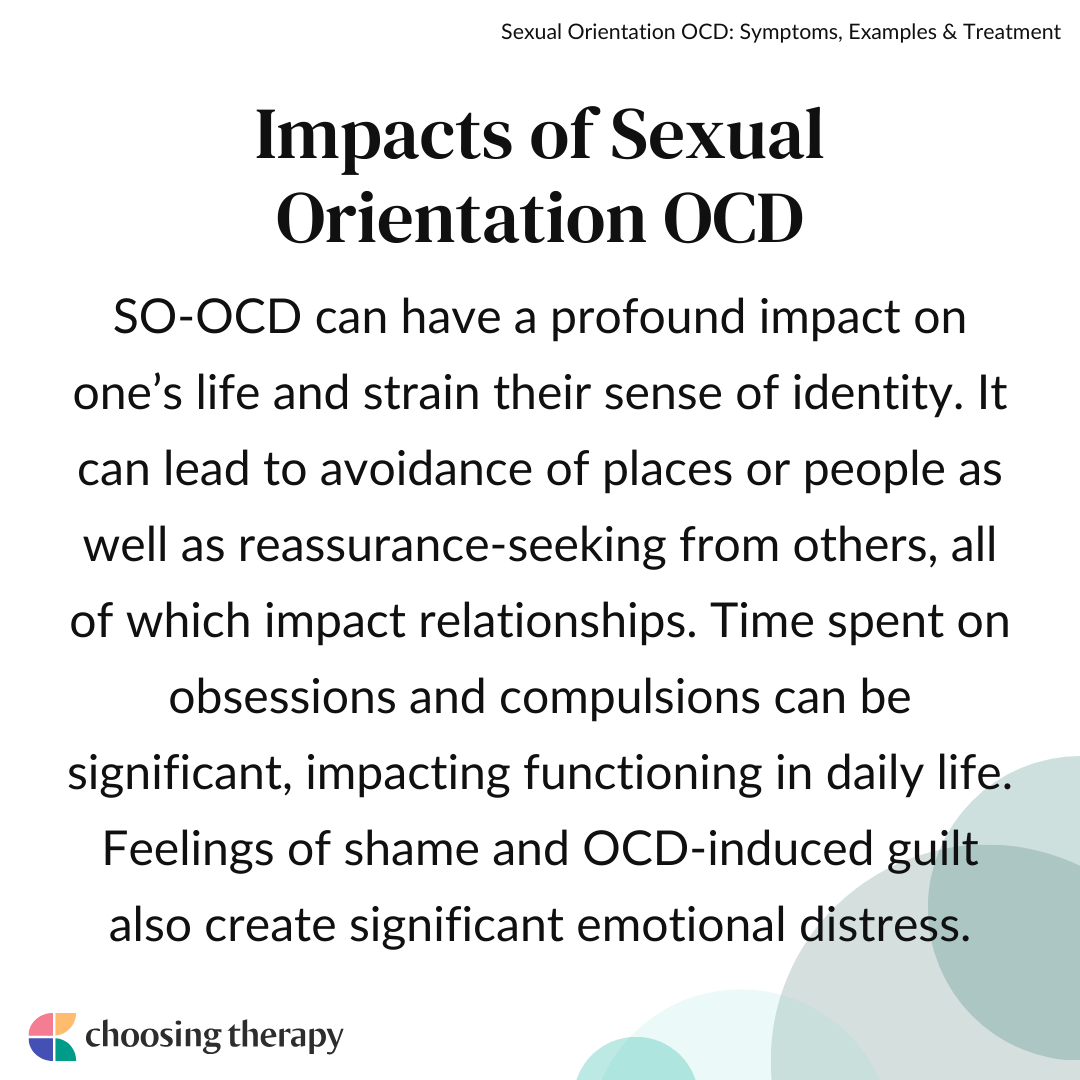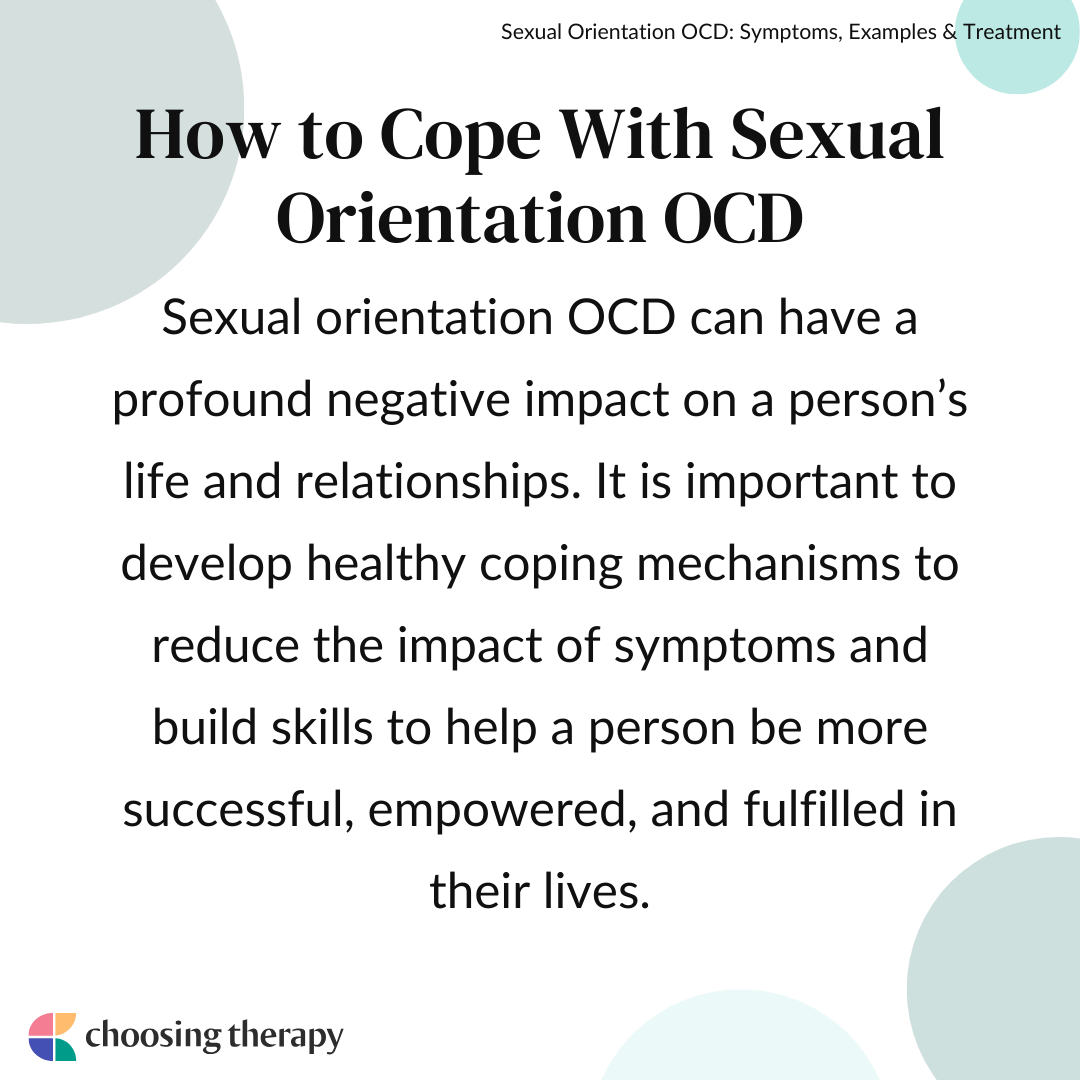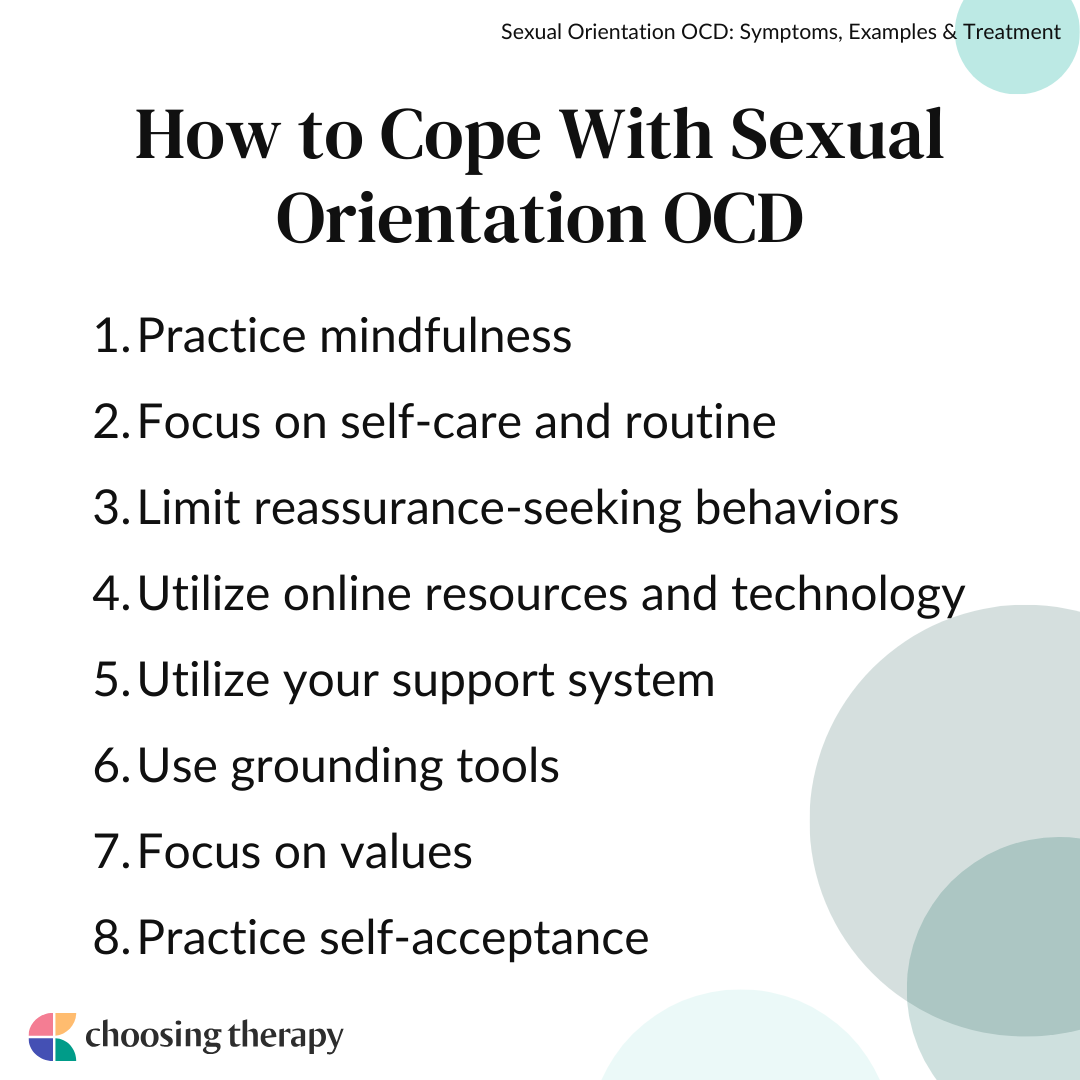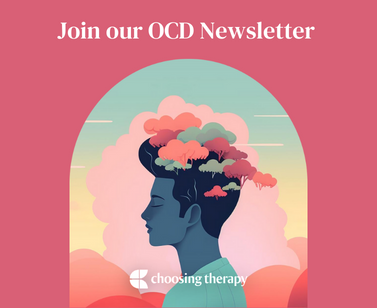Sexual orientation OCD is a subtype of OCD in which a person has obsessions and compulsions centered around their sexual orientation. The obsessions can sometimes be triggered by interactions with people of a different sexual orientation, seeing same-sex relationships in media, or by comments from others. Therapy and medication can help reduce the impact of symptoms.
What is the best therapy for OCD? Exposure And Response Prevention Therapy (ERP) – Do live video sessions with a therapist specialized in ERP, the gold standard treatment for OCD. Treatment from NOCD is covered by many insurance plans. Start With A Free 15 Minute Call
What Is Sexual Orientation OCD?
Sexual orientation OCD is a type of obsessive-compulsive disorder (OCD) in which a person has intrusive and obsessive thoughts about their sexual orientation. These worries and obsessions are not related to their actual sexual orientation but rather to their fears and worries about it. To cope with these distressing, obsessive thoughts, individuals may practice compulsions, although the compulsions exacerbate the anxiety in the long run.
Sexual orientation OCD is characterized by:
- Obsessions: Obsessions are intrusive thoughts that are unwanted, uncontrolled, and cause a great deal of distress. In sexual orientation OCD, these obsessions center around fears and doubts about one’s sexual orientation.
- Compulsions: Compulsions are rituals or repeated behaviors that are intended to reduce the anxiety related to the obsessions. In sexual orientation OCD, this could include asking friends or loved ones repeatedly for reassurance about one’s sexual orientation or performing mental acts like counting or repeating a phrase over and over.
Sexual Orientation OCD Vs. Compulsory Heterosexuality
Compulsory heterosexuality (comphet) is a concept with feminist roots, based on the idea that society prioritizes heterosexual relationships above others. Comphet is a societal construct, while SO-OCD happens on an individual level. Through this lens, compulsory heterosexuality could be a factor in SO-OCD if a person fears that they were pressured into a heterosexual relationship by societal expectations.1
Symptoms of Sexual Orientation OCD
Symptoms of SO-OCD, in addition to the overall symptoms of OCD, include recurrent, distressing, and intrusive thoughts about one’s sexuality. A person with sexual orientation OCD may avoid people with a different sexual orientation than their own out of fear that they may act out of their repressed sexual desires or ask friends and loved ones for constant reassurance about their sexual orientation.
Common obsessions in sexual orientation OCD include:
- Constantly wondering whether they might be gay
- Unwanted sexually intrusive thoughts or images
- Ruminating on doubts about sexual identity
- Fear of judgment from others regarding sexual identity
- OCD-induced guilt or shame related to religious/familial beliefs regarding sexuality, even when a person has not done anything to go against those beliefs
- Fears about potential consequences or punishment regarding sexual identity
Common compulsions in sexual orientation OCD include:
- Reading about different types of sexual orientation other than their own to look for similarities or differences
- Obsessively seeking reassurance from others about their sexual identity
- Performing mental acts, like running through a list of interactions with others to check for signs of sexual attraction
- Comparing oneself to others and looking for signs of homosexuality
- Looking at images or media to check for signs of sexual attraction
- Repeating words or phrases believed to keep fears from coming true
- Avoiding people, places, or things that a person fears could trigger their hidden desires
- Checking for a groinal response when thinking about sexual attraction
What Triggers Sexual Orientation OCD Symptoms?
It’s not uncommon for stressors and certain situations to trigger OCD symptoms. One potential reason is that neurotransmitters in the brain respond to stressful situations, which can change the chemical balance and trigger obsessive thoughts. In sexual orientation OCD, these situations can trigger a person to doubt their sexual orientation and set off an obsessive spiral.
Common triggers for sexual orientation OCD include:
- Receiving a compliment from someone of the same sex who is queer
- Close relationships with people from a different sexual orientation
- Seeing homosexual relationships in media
- Comments or judgments from family members
- Discussions about sex or sexual orientation
- Hearing religious or cultural messages about sexual orientation
How much do you know about OCD? Take This 11-Question OCD Quiz From NOCD. If you or a loved one are struggling with OCD, NOCD provides convenient, affordable, and effective OCD treatment covered by most major insurance plans.
Causes of Sexual Orientation OCD
There is no known cause specific to sexual orientation. General OCD is thought to be caused by a combination of genetic, environmental, brain biology, and cognitive factors.
A person is more likely to develop OCD when there is a family history of OCD. Genetics linked with OCD are a strong component and can influence the onset. Research also shows that differences in physical structure and the network connections in the brain can lead to the development of OCD.2 Traumatic events, stressors, and other life experiences can lead to higher chances of developing OCD.
Observing obsessive and compulsive behaviors in others during childhood may lead a person to develop those same patterns themselves. For instance, a person whose parent has OCD is at increased risk for developing the disorder, not only because of the genetic component but because of learning those thought patterns and behaviors from their parent.
Impacts of Sexual Orientation OCD
SO-OCD can have a profound impact on one’s life and strain their sense of identity. It can lead to avoidance of places or people and reassurance-seeking from others, all of which impact relationships. Time spent on obsessions and compulsions can be significant, impacting functioning in daily life. Feelings of shame and OCD-induced guilt also create significant emotional distress.
How Is Sexual Orientation OCD Diagnosed?
Sexual orientation OCD is diagnosed by a mental health professional, such as a therapist, psychiatric nurse practitioner, or psychiatrist. These professionals use a combination of clinical assessment, interviewing skills, and assessment tools to examine the symptoms and develop a proper diagnosis.3
The Yale-Brown Obsessive Compulsive Inventory is a short, 10-item scale that is commonly used in the diagnosis of OCD. Mental health professionals will utilize assessment tools like this, along with the symptom criteria in the DSM 5, to determine the best possible diagnosis. Having an accurate diagnosis is important because that will inform providers of the best treatment plan.4
Questions to ask your doctor about sexual orientation OCD include:
- Where can I find specialized Sexual Orientation OCD treatment?
- What does a typical treatment plan look like?
- What medications can be helpful?
- Are there any side effects I should be aware of?
- What do you think is the best treatment for me?
- Does insurance cover my appointments?
Treatment for Sexual Orientation OCD
Treatment for sexual orientation OCD will look similar to other types of OCD treatment. A comprehensive treatment plan includes therapy, medication, and tools to support behavioral change. This includes psychoeducation to help individuals learn about their specific SO-OCD subtype as well as ways to manage it. The overall goal is to reduce the impact of symptoms and help someone lead a fulfilling life.
Treatment For OCD NOCD: Online OCD Treatment Covered By Insurance – Regain your life from OCD. Do live video sessions with a licensed therapist specialized in treating OCD. Treatment from NOCD is covered by most major insurance plans. Learn how you can use your insurance benefits. Visit NOCD Talkiatry: Is OCD Medication Right For You? Speak with A Doctor – Talkiatry can match you with a psychiatrist who takes your insurance and is accepting new patients. They’re in-network with major insurers and offer medication management with supportive therapy. Free Assessment
Therapy for SO-OCD
Therapy for SO-OCD includes increasing the ability to tolerate anxiety, reducing compulsive behaviors, and developing healthy coping skills for OCD. Exposure and response prevention (ERP) is usually the frontline therapy because it has been used extensively to treat OCD and is shown to be highly effective. ERP is sometimes used in conjunction with cognitive behavioral therapy (CBT).5
Effective therapy options for sexual orientation OCD include:
- Exposure response prevention (ERP): Research shows that ERP is a highly effective therapy for all types of OCD, including sexual orientation OCD. It works by gradually exposing a person to their fears while helping to reduce the anxiety that results from it.
- Cognitive behavioral therapy (CBT): CBT for OCD works by helping an individual challenge and replace the automatic negative thoughts. This can help reduce the anxiety caused by these thoughts and help them to develop a healthier thought process and mindset.
- Acceptance and commitment therapy (ACT): While ACT for OCD alone is not the first choice for treating OCD, it can be a helpful addition to any type of treatment. ACT uses acceptance and mindfulness to help a person accept their current situation and start to develop a more non-judgmental, compassionate stance toward themselves, their lives, and others.
- Eye movement desensitization and reprocessing (EMDR): EMDR for OCD can be a good choice for OCD when there is a known traumatic event in a person’s history. EMDR works by healing and reprocessing those past traumas, which helps to remove some of the current-day triggers that can lead to OCD obsessions.
- Dialectical behavior therapy (DBT): DBT is a structured treatment approach that is known for utilizing tools and skills to help people tolerate distress, which could be useful in the treatment of OCD.
Medication for SO-OCD
In addition to therapy, mental health professionals can utilize medications in managing OCD, especially selective serotonin reuptake inhibitors (SSRIs). Mild OCD may resolve with therapy alone, but for many, medication is an important part of getting symptoms under control. It is important for each person to have a tailored treatment plan created for their specific OCD subtype and symptoms.
When to Seek Professional Support.
OCD is a serious mental disorder that can often be lifelong without proper help. If you suspect that you may have SO-OCD or any other type of OCD, please seek treatment from a qualified mental health professional. An online therapist directory or online therapy platform can help find a qualified professional.
If a person’s symptoms are severe or persistent, or they’re struggling to function in daily life, it may be time to find a psychiatrist. Some other signs are thoughts of suicide or self-harm, changes in personality, difficulty sleeping, or trouble coping with stressors. Online psychiatrist options can be a good choice for finding OCD medication management, especially when getting to appointments is a problem.
What is the best therapy for OCD? Exposure And Response Prevention Therapy (ERP) – Do live video sessions with a therapist specialized in ERP, the gold standard treatment for OCD. Treatment from NOCD is covered by many insurance plans. Start With A Free 15 Minute Call
How to Cope With Sexual Orientation OCD
Sexual orientation OCD can have a profound negative impact on a person’s life and relationships. It is important to develop healthy coping mechanisms to reduce the impact of symptoms and build skills to help a person be more successful, empowered, and fulfilled in their lives.
Here are eight tips for coping with sexual orientation OCD:
1. Practice Mindfulness
Mindfulness techniques can help people with SO-OCD learn to observe their thoughts without judgment. This allows them to practice self-compassion and act based on values and goals rather than on fears. Meditation techniques for OCD can help a person be more present at the moment and reduce their stress level.
Here are some mindfulness techniques to try for SO-OCD:
- Noticing the breath coming in and going out
- Loving-kindness meditation
- Noticing where anxiety is present in the body with a sense of curiosity
- Accepting one’s emotions and doubts about sexuality as a part of life
2. Focus on Self-Care & Routine
Regular self-care routines, including exercise, a balanced diet, and sufficient sleep, are critical for managing SO-OCD. High levels of stress can cause OCD symptoms to get worse and make a person more susceptible to triggers. Healthy routines can help a person manage their stress levels and, in turn, reduce symptoms.
3. Limit Reassurance-Seeking Behaviors
It’s important to reduce reassurance-seeking actions, like asking others for reassurance about one’s sexual orientation. Seeking reassurance can provide temporary relief, so when obsessive thoughts return, a person will go back for more reassurance. This is a compulsive OCD cycle that strains relationships and can make obsessions worse. Reducing these behaviors can help break the cycle between obsessions and compulsions.
4. Utilize Online Resources & Technology
Online OCD resources and technology, like mental health apps, can provide accessible coping techniques and support for those with SO-OCD. Some specific examples include GGOC: OCD Relief, OCD Challenge, and MoodTools. These apps can help a person track thoughts, manage symptoms, and build healthy coping skills.
5. Utilize Your Support System
When dealing with SO-OCD, a support system of friends and family that you can talk to and be yourself with is crucial. It is helpful to have someone to share your progress with but also to be able just to laugh and have fun together. In addition, people who accept you regardless of your sexual orientation can help you feel supported and less alone.
6. Use Grounding Tools
Grounding tools to help you get back into the present moment and tune in with your senses. One technique is called 5-4-3-2-1. Notice five things you can see, four things you can touch, three things you can hear, two things you can smell, and one thing you can taste. Noticing your senses helps you focus less on thoughts and more on the present moment.
7. Focus on Values.
Take time to get clear on your values. These things have nothing to do with sexual orientation but rather things like kindness, being a good friend, or education. Use your values rather than your fears to help you decide what to do next. For someone with sexual orientation OCD, this might look like going out with friends regardless of who might be there.
8. Practice Self-Acceptance
Work on learning to love and accept yourself no matter what your sexual orientation. SO-OCD is based on a fear that having a certain sexual orientation means that they are bad or broken. Sexual orientation has nothing to do with your value and worth as a person, and accepting this can help reduce the impact of SO-OCD.
Overcoming the Stigma of Sexual Orientation OCD
There is a stigma associated with sexual orientation as well as with mental health disorders, and individuals with SO-OCD may feel it from both sides. Societal judgment and misconceptions can lead to guilt, shame, and isolation, increasing emotional distress. Encouraging open conversations and sharing stories is a way to raise awareness to foster understanding and support for those affected.
In My Experience
To help our readers take the next step in their mental health journey, Choosing Therapy has partnered with leaders in mental health and wellness. Choosing Therapy is compensated for marketing by the companies included below. OCD Therapy NOCD: Effective, Affordable, & Convenient OCD Therapy Do live, face-to-face video sessions with a therapist who specializes in treating OCD and get 24/7 support between sessions. NOCD is covered by many insurance plans and is available nationwide. Visit NOCD Treatment From An Online Psychiatrist Talkiatry OCD is treatable. Talkiatry specializes in OCD and provides personalized care with medication and additional support. Get started with a short assessment. OCD Community - Free To Join! Join others who are overcoming OCD. Participate anonymously. Find support, connect, and overcome challenges with us. The community is managed by NOCD. Join The Community OCD Newsletter A free newsletter from Choosing Therapy for those impacted by OCD. Get helpful tips and the latest information. Sign-UpAdditional Resources
What to know when finding a therapist for OCD With so much information out there regarding providers and treatment options for obsessive compulsive disorder, it can be hard to know exactly where to start—especially when you have to consider everything from the type of provider to the different treatment methods, as well as how you’ll fit it into your busy schedule. Can OCD make it hard to make decisions? From choosing what to wear in the morning to picking what to eat for dinner, decision-making is a part of everyone’s daily routine. But for millions of people with Obsessive-Compulsive Disorder (OCD), making any choice can feel like a daunting, sometimes impossible task.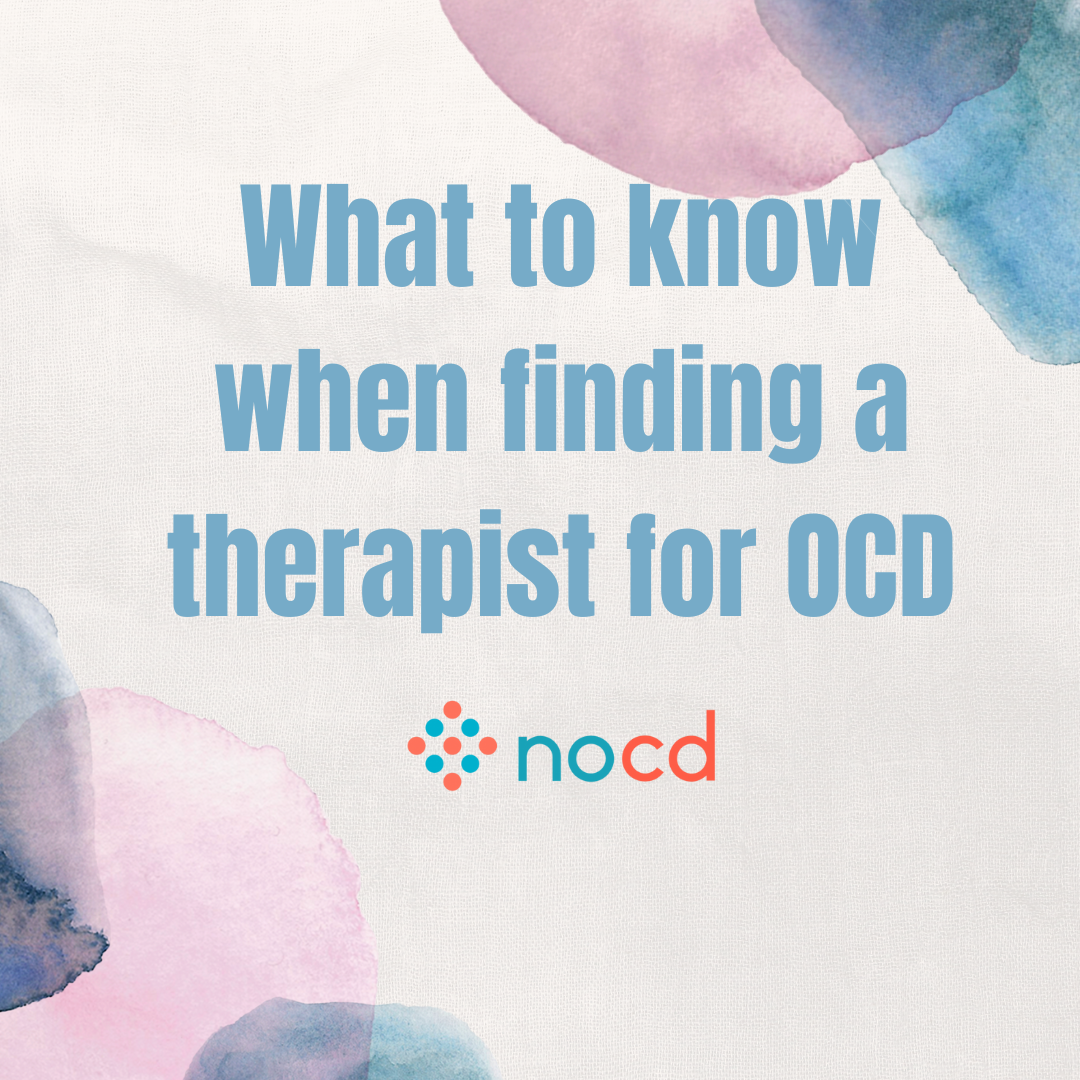
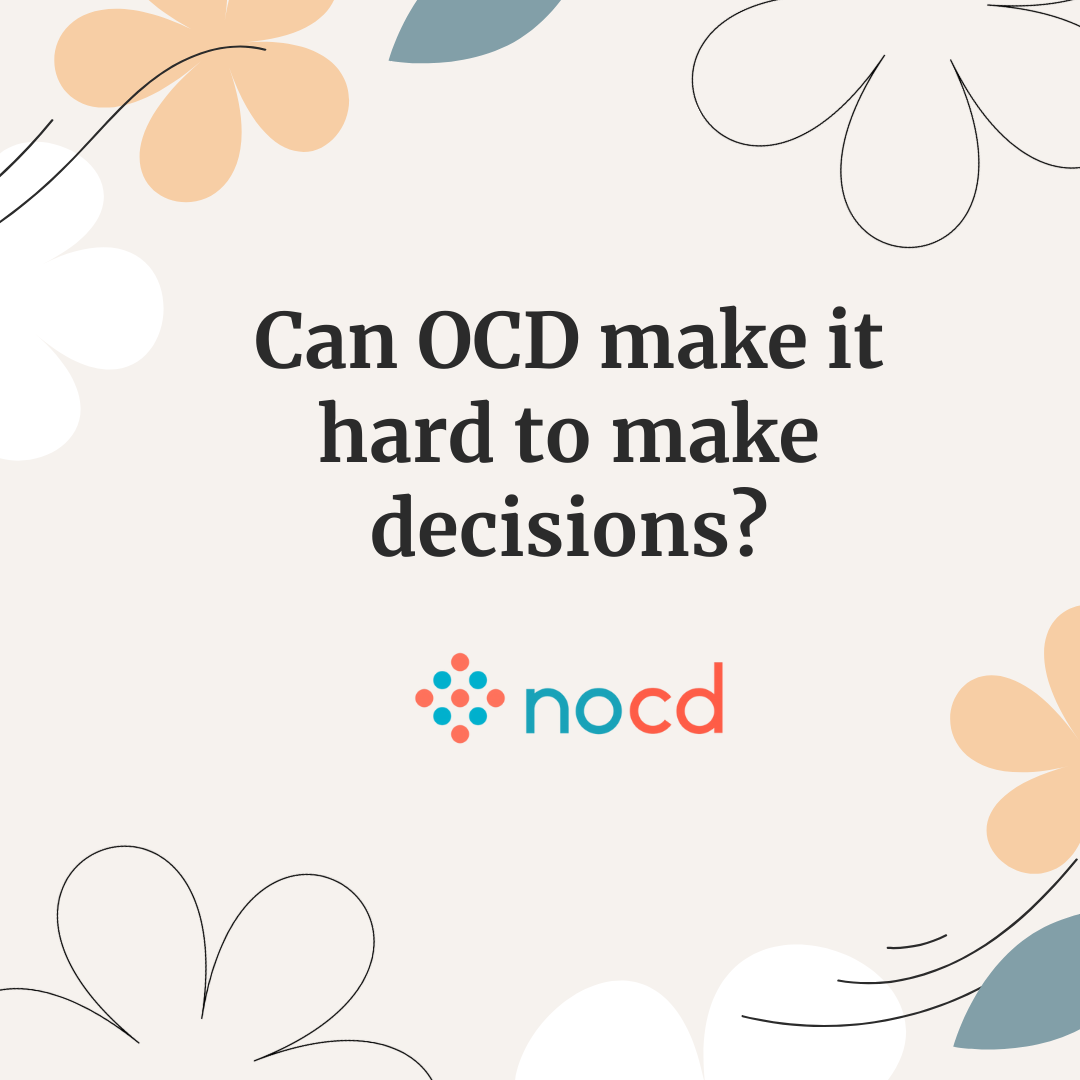
Sexual Orientation OCD Infographics
